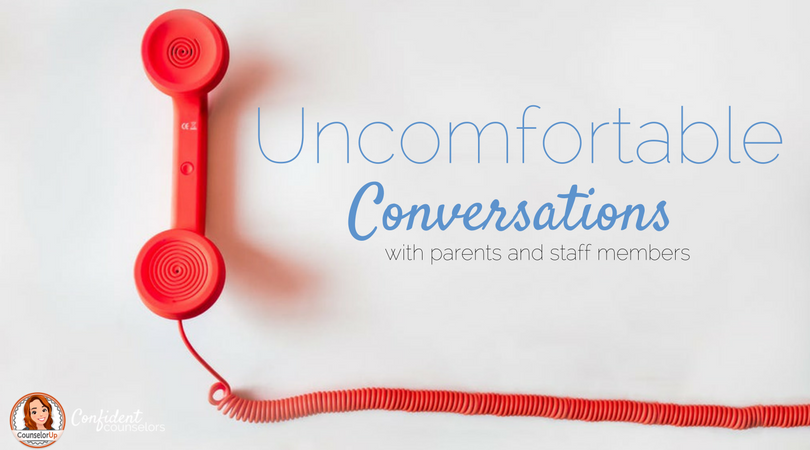I have a saying, “If it’s uncomfortable, give it to the counselor.”
Any time that an awkward or uncomfortable conversation needs to take place with a parent, staff member, or volunteer, counselors are called to use our skills to smooth the way for those involved.
Uncomfortable conversations include discussing parenting skills, classroom management, disclosing abuse, or speaking with a parent about their child’s suicidal ideation. Sometimes uncomfortable conversations escalate and become uncomfortable for you as the counselor.
Empathy
A conversation with a parent about their child pushes all their buttons and triggers. Maybe their child has some of the same issues that they themselves had as a child. Maybe they are scared about what the impact of what you are sharing is for their child. This is also true for teachers and staff members. For most, being an educator is not a job but a vocation. When speaking with staff members about their work, empathy can go a long way to overcoming the feeling that you are attacking.
How do you best show empathy? Listen, listen, listen.
Often when we have an uncomfortable conversation, we want to make sure that we check off the boxes of what needs to be said. Calling about suicidal ideation? You want to make sure that you share the next steps and the “what now.” However, the parent might still be reeling and not yet be ready to think about next steps.
Ask questions like, “This is a lot, how are you feeling?” Let parents and teachers know that you care about how they are.
Refuse to Escalate
Whether the parent or teacher is angry, worried, or upset, refuse to escalate with them. Your calm and confidence will counterbalance their escalation. This is one of the hardest to do!
I find it helpful to use the same techniques I use with students. I take calm breaths and give myself mental space to allow the behavior to happen in front of me rather than to me. It takes practice but it really does work!
If the adult I am speaking with is being rude or offensive, I calmly say “I am ready to talk to you about this when you are calm enough to have a conversation. Why don’t you give me a call back when you’re ready.”
Keep It Focused
You want to help their child, they want to help their child. Return to this as often as possible.
I once had a conversation with a parent about their child being bullied. They were very frustrated that I couldn’t tell them more about what was happening with the other student. There was no convincing that we had to follow federal law and keep student information confidential. I kept repeating, “We are 100% committed to your child’s safety and emotional well-being at school.” Eventually, the parents were able to de-escalate and move to problem-solving.
If a coworker escalates, it usually involves an inability to focus on the issue at hand. They are frustrated or concerned and can’t get to the point of problem-solving. The same technique works here. We can keep it focused on moving forward to support the student.
I have a secret phrase that I rely on when I am starting to get frustrated and don’t want to let it show. It works great when a coworker is venting and you want to move the conversation forward.
I simply say, “I hear ya.”
It gives a feeling of support even if I don’t agree with what’s being said. You don’t have to use that phrase but finding a stock phrase that will work for you can help you to remain focused when you begin to get frustrated.
Staff Members
Sometimes having uncomfortable conversations with staff members is even more challenging because you have to see them every day. You might also see them outside of work and be actual friends with them. There is value in calling out the situation as it is so that you can discuss and move forward.
I once worked with a teacher who felt like I had tattled on her to the principal. In retrospect, I completely see where she was coming from. For a while, she gave me the cold shoulder and I couldn’t figure out what was going on. I finally went to her and told her that I could tell something was wrong. We ended up having a good conversation where we both cleared the air.
Uncomfortable conversations are sometimes the very best for moving forward in our work for students. Make sure to check out our Confident Conversations post for some great ideas from my colleagues!




I am writing the “I am ready to talk to you about this when you are calm…: suggestion on a sticky note and keeping it by my phone at school. Thank you!
So glad it’s helpful! Send us a picture – we’d love to see 🙂
Hi- is it possible to post this in our state’s school counselor newsletter with credit to your website? I am seeking permission prior to posting. Thanks!
Hi Clare! We would be honored, thank you!